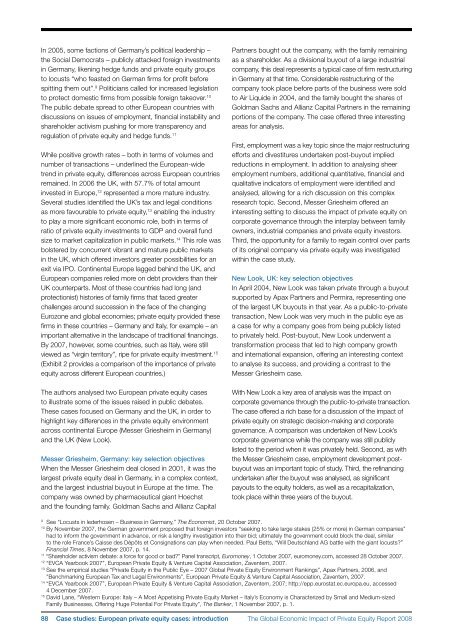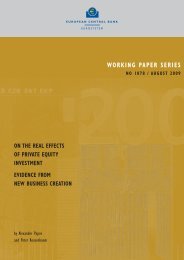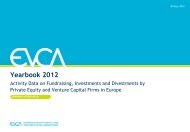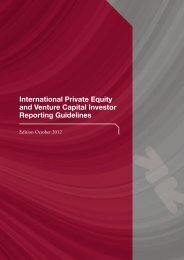The Global Economic Impact of Private Equity Report 2008 - World ...
The Global Economic Impact of Private Equity Report 2008 - World ...
The Global Economic Impact of Private Equity Report 2008 - World ...
- No tags were found...
You also want an ePaper? Increase the reach of your titles
YUMPU automatically turns print PDFs into web optimized ePapers that Google loves.
In 2005, some factions <strong>of</strong> Germany’s political leadership –the Social Democrats – publicly attacked foreign investmentsin Germany, likening hedge funds and private equity groupsto locusts “who feasted on German firms for pr<strong>of</strong>it beforespitting them out”. 9 Politicians called for increased legislationto protect domestic firms from possible foreign takeover. 10<strong>The</strong> public debate spread to other European countries withdiscussions on issues <strong>of</strong> employment, financial instability andshareholder activism pushing for more transparency andregulation <strong>of</strong> private equity and hedge funds. 11While positive growth rates – both in terms <strong>of</strong> volumes andnumber <strong>of</strong> transactions – underlined the European‐widetrend in private equity, differences across European countriesremained. In 2006 the UK, with 57.7% <strong>of</strong> total amountinvested in Europe, 12 represented a more mature industry.Several studies identified the UK’s tax and legal conditionsas more favourable to private equity, 13 enabling the industryto play a more significant economic role, both in terms <strong>of</strong>ratio <strong>of</strong> private equity investments to GDP and overall fundsize to market capitalization in public markets. 14 This role wasbolstered by concurrent vibrant and mature public marketsin the UK, which <strong>of</strong>fered investors greater possibilities for anexit via IPO. Continental Europe lagged behind the UK, andEuropean companies relied more on debt providers than theirUK counterparts. Most <strong>of</strong> these countries had long (andprotectionist) histories <strong>of</strong> family firms that faced greaterchallenges around succession in the face <strong>of</strong> the changingEurozone and global economies; private equity provided thesefirms in these countries – Germany and Italy, for example – animportant alternative in the landscape <strong>of</strong> traditional financings.By 2007, however, some countries, such as Italy, were stillviewed as “virgin territory”, ripe for private equity investment. 15(Exhibit 2 provides a comparison <strong>of</strong> the importance <strong>of</strong> privateequity across different European countries.)<strong>The</strong> authors analysed two European private equity casesto illustrate some <strong>of</strong> the issues raised in public debates.<strong>The</strong>se cases focused on Germany and the UK, in order tohighlight key differences in the private equity environmentacross continental Europe (Messer Griesheim in Germany)and the UK (New Look).Messer Griesheim, Germany: key selection objectivesWhen the Messer Griesheim deal closed in 2001, it was thelargest private equity deal in Germany, in a complex context,and the largest industrial buyout in Europe at the time. <strong>The</strong>company was owned by pharmaceutical giant Hoechstand the founding family. Goldman Sachs and Allianz CapitalPartners bought out the company, with the family remainingas a shareholder. As a divisional buyout <strong>of</strong> a large industrialcompany, this deal represents a typical case <strong>of</strong> firm restructuringin Germany at that time. Considerable restructuring <strong>of</strong> thecompany took place before parts <strong>of</strong> the business were soldto Air Liquide in 2004, and the family bought the shares <strong>of</strong>Goldman Sachs and Allianz Capital Partners in the remainingportions <strong>of</strong> the company. <strong>The</strong> case <strong>of</strong>fered three interestingareas for analysis.First, employment was a key topic since the major restructuringefforts and divestitures undertaken post‐buyout impliedreductions in employment. In addition to analysing sheeremployment numbers, additional quantitative, financial andqualitative indicators <strong>of</strong> employment were identified andanalysed, allowing for a rich discussion on this complexresearch topic. Second, Messer Griesheim <strong>of</strong>fered aninteresting setting to discuss the impact <strong>of</strong> private equity oncorporate governance through the interplay between familyowners, industrial companies and private equity investors.Third, the opportunity for a family to regain control over parts<strong>of</strong> its original company via private equity was investigatedwithin the case study.New Look, UK: key selection objectivesIn April 2004, New Look was taken private through a buyoutsupported by Apax Partners and Permira, representing one<strong>of</strong> the largest UK buyouts in that year. As a public‐to‐privatetransaction, New Look was very much in the public eye asa case for why a company goes from being publicly listedto privately held. Post‐buyout, New Look underwent atransformation process that led to high company growthand international expansion, <strong>of</strong>fering an interesting contextto analyse its success, and providing a contrast to theMesser Griesheim case.With New Look a key area <strong>of</strong> analysis was the impact oncorporate governance through the public‐to‐private transaction.<strong>The</strong> case <strong>of</strong>fered a rich base for a discussion <strong>of</strong> the impact <strong>of</strong>private equity on strategic decision‐making and corporategovernance. A comparison was undertaken <strong>of</strong> New Look’scorporate governance while the company was still publiclylisted to the period when it was privately held. Second, as withthe Messer Griesheim case, employment development postbuyoutwas an important topic <strong>of</strong> study. Third, the refinancingundertaken after the buyout was analysed, as significantpayouts to the equity holders, as well as a recapitalization,took place within three years <strong>of</strong> the buyout.9See “Locusts in lederhosen – Business in Germany,” <strong>The</strong> Economist, 20 October 2007.10By November 2007, the German government proposed that foreign investors “seeking to take large stakes (25% or more) in German companies”had to inform the government in advance, or risk a lengthy investigation into their bid; ultimately the government could block the deal, similarto the role France’s Caisse des Dépôts et Consignations can play when needed. Paul Betts, “Will Deutschland AG battle with the giant locusts?”Financial Times, 8 November 2007, p. 14.11“Shareholder activism debate: a force for good or bad?” Panel transcript, Euromoney, 1 October 2007, euromoney.com, accessed 28 October 2007.12“EVCA Yearbook 2007”, European <strong>Private</strong> <strong>Equity</strong> & Venture Capital Association, Zaventem, 2007.13See the empirical studies “<strong>Private</strong> <strong>Equity</strong> in the Public Eye – 2007 <strong>Global</strong> <strong>Private</strong> <strong>Equity</strong> Environment Rankings”, Apax Partners, 2006, and”Benchmarking European Tax and Legal Environments”, European <strong>Private</strong> <strong>Equity</strong> & Venture Capital Association, Zaventem, 2007.14“EVCA Yearbook 2007”, European <strong>Private</strong> <strong>Equity</strong> & Venture Capital Association, Zaventem, 2007; http://epp.eurostat.ec.europa.eu, accessed4 December 2007.15David Lane, “Western Europe: Italy – A Most Appetising <strong>Private</strong> <strong>Equity</strong> Market – Italy’s Economy is Characterized by Small and Medium-sizedFamily Businesses, Offering Huge Potential For <strong>Private</strong> <strong>Equity</strong>”, <strong>The</strong> Banker, 1 November 2007, p. 1.88Case studies: European private equity cases: introduction<strong>The</strong> <strong>Global</strong> <strong>Economic</strong> <strong>Impact</strong> <strong>of</strong> <strong>Private</strong> <strong>Equity</strong> <strong>Report</strong> <strong>2008</strong>















